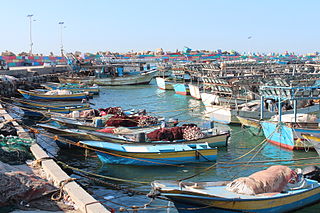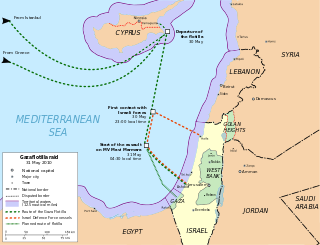
The Gaza Strip, or simply Gaza, is a self-governing Palestinian territory on the eastern coast of the Mediterranean Sea, that borders Egypt on the southwest for 11 kilometers (6.8 mi) and Israel on the east and north along a 51 km (32 mi) border. Gaza and the West Bank are claimed by the State of Palestine.
The Al Mezan Center for Human Rights or Al Mezan (ميزان) is a non-governmental organization based in the Jabalia Palestinian refugee camp in the Gaza Strip. Its declared goals are: To promote and protect human rights in the OPT and especially in the Gaza Strip with a focus on economic, social and cultural rights (ESCR); to work towards the realization of Palestinians’ individual and collective human rights, including the right to self-determination through the channels of international law; to enhance democracy and citizen participation in the OPT and press towards good governance that respects human rights. The organization has a special consultative status in the United Nations.
This article describes transport in the Palestinian territories, which consists of two non-contiguous territories, the West Bank and the Gaza Strip, different parts of which are administered by Palestinian National Authority, Hamas Administration in Gaza and Israel. Egress and ingress to these territories de jure is controlled by Israel, but such control is not enforced on the Gaza land border with Egypt.

Jews for Justice for Palestinians (JfJfP) is a group based in Britain that describes itself as advocating for human and civil rights, and economic and political freedom, for the Palestinian people. It opposes the current policy of Israel towards the Palestinian territories, particularly the territories of the West Bank and Gaza Strip, and seeks a change in their political status. Its membership is primarily British Jews.

The Free Gaza Movement is a coalition of human rights activists and pro-Palestinian groups formed to challenge the Israeli–Egyptian blockade imposed on the Gaza Strip by sailing humanitarian aid ships to Gaza. The group has more than 70 endorsers, including Desmond Tutu and Noam Chomsky.

The Port of Gaza is a small port near the Rimal district of Gaza City. It is the home port of Palestinian fishing-boats and the base of the Palestinian Naval Police, a branch of the Palestinian National Security Forces. Under the Oslo II Accord, the activities of the Palestinian Naval Police are restricted to 6 nautial miles from the coast. Since 2007, the Port of Gaza has been under an Israeli-imposed naval blockade as part of a blockade of the Gaza Strip, and activities at the port have been restricted to small-scale fishing.

The Gaza flotilla raid was a military operation by Israel against six civilian ships of the "Gaza Freedom Flotilla" on 31 May 2010 in international waters in the Mediterranean Sea. Nine activists were killed on one ship during the raid and ten Israeli soldiers were wounded, one seriously. One further Turkish activist died later of his wounds. Three of the six flotilla ships, organized by the Free Gaza Movement and the Turkish Foundation for Human Rights and Freedoms and Humanitarian Relief (İHH), were carrying humanitarian aid and construction materials, with the intention of breaking the Israeli blockade of the Gaza Strip. Israel had warned the flotilla to abort their mission, describing it as a provocation.

MV Mavi Marmara is a Comoros-flagged passenger ship, which was formerly owned and operated by İDO Istanbul Fast Ferries Co. Inc. on the line Sarayburnu, Istanbul-Marmara Island-Avşa Island in the Sea of Marmara. Built at the Golden Gate Shipyard by Turkish Shipbuilding Co. in 1994, the ship has a capacity of 1,080 passengers. It is best known for its participation in the Gaza Freedom Flotilla and the deadly confrontation that took place on it during the Gaza flotilla raid.
Reactions to the Gaza flotilla raid on 31 May 2010 ranged from fierce condemnation to strong support for Israel.
Many legal assessments of the Gaza flotilla raid were published subsequent to the event. International law experts differed over the legality of the action by Israel. Most agree that Israel is entitled to impose and enforce a naval blockade, that Israel can intercept a ship in international waters headed for a belligerent territory, that Israel may use force when intercepting such ships, and that there must be a proportional relationship between the threat and response. The force necessary to respond to violent resistance and whether the force that was used was proportionate were disputed.
The Gaza Freedom Flotilla, organized by the Free Gaza Movement and the Turkish Foundation for Human Rights and Freedoms and Humanitarian Relief (İHH), was carrying humanitarian aid and construction materials, with the intention of breaking the Israeli-Egyptian blockade of the Gaza Strip. In normal circumstances, aid is brought to Israel to be inspected and then transferred to Gaza.

Greta K. Berlin is an American pro-Palestinian activist. She has been a spokesperson for the Free Gaza Movement (FGM), which she co-founded in 2006.
Events in the year 2010 in the Palestinian territories.
Events in the year 2011 in the Palestinian territories.
"Freedom Flotilla II – Stay Human" was a flotilla that planned to break the maritime blockade of the Gaza Strip by Israel by sailing to Gaza on 5 July 2011. Ultimately, the sailing did not take place.
Gaza Seaport is a planned seaport in the Gaza Strip. The establishment of a Gaza seaport was mentioned in the Oslo I Accord, as early as 1993. The 1999 Sharm el-Sheikh Memorandum determined that the construction works could commence on 1 October 1999. The project started on 18 July 2000, but was stopped in an early stage due to obstruction of the supply of construction materials, and destruction by the Israeli army in September and October 2000 when the Second Intifada inflamed. The 2005 Agreement on Movement and Access, following the Israel's withdrawal from Gaza, re-announced the start of the works. Israel promised to assure donors that it will not interfere with operation of the port. As of 2014, however, the construction has not been resumed.
Freedom Flotilla III (#FF3) was a flotilla that planned to break the blockade of the Gaza Strip by Israel by sailing to Gaza. It started from Sweden on 10 May 2015 and stopped in several European cities along the way to Gaza. It started officially from Athens, Greece on 25 June 2015. Few details were released in advance.
The Women's Boat to Gaza (WBG) was an initiative by the Freedom Flotilla Coalition in 2016 to challenge the Israeli naval blockade of the Gaza Strip. The WBG consisted of an entirely female crew and one ship, Zaytouna-Oliva. It started from Barcelona on 14 September 2016 and visited Ajaccio, Corsica and Messina, Sicily along the way. On 5 October 2016, the Israeli Navy intercepted the Women's Boat to Gaza and detained its crew members, who were taken to the Israeli port of Ashdod. The activists were subsequently deported to their home countries.
The Just Future for Palestine Flotilla, also known as the JFP Flotilla and the 2018 Gaza Freedom Flotilla, was a 2018 campaign by the Freedom Flotilla Coalition to challenge the Israeli-Egyptian-Palestinian naval blockade of the Gaza Strip. The flotilla consisted of two ships Al Awda and Freedom and two yachts Mairead and Falestine.










